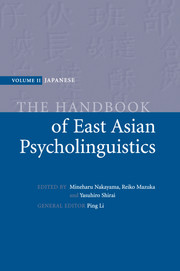Book contents
- Frontmatter
- Contents
- List of figures
- List of contributors
- In memory of Miwa Nishimura
- Preface
- Introduction
- Language acquisition
- 1 Ontogeny of language
- 2 Caregivers' speech
- 3 The intrinsic link between gesture and speech at the prelinguistic stage
- 4 Infant speech perception
- 5 Phonological acquisition
- 6 The mechanism of lexical development: implications from Japanese children's word learning
- 7 The acquisition of nouns and verbs in Japanese
- 8 The acquisition of verbal nouns
- 9 The acquisition of Japanese numeral classifiers
- 10 The acquisition of case markers
- 11 The acquisition of tense and aspect
- 12 On the origin of children's errors: the case of Japanese negation and direct passive
- 13 Binding Theory in UG and first-language acquisition of Japanese
- 14 The acquisition of the particles ne, yo, and no
- 15 The acquisition of linguistic politeness in Japanese
- 16 Children's narrative structures
- 17 Memory talk and testimony in children
- 18 Developmental dyslexia
- 19 Japanese Sign Language
- 20 The role of an innate acquisition device in second-language acquisition
- 21 Japanese, the grammar of reflexives, and second-language acquisition
- 22 Processes in L2 Japanese sentence production
- 23 The development of lexical competence among second-language readers
- 24 Reading in Japanese as a second language
- 25 Intrasentential code-switching in Japanese and English
- Part II Language processing
- References
- Name index
- Subject index
4 - Infant speech perception
from Language acquisition
Published online by Cambridge University Press: 05 June 2012
- Frontmatter
- Contents
- List of figures
- List of contributors
- In memory of Miwa Nishimura
- Preface
- Introduction
- Language acquisition
- 1 Ontogeny of language
- 2 Caregivers' speech
- 3 The intrinsic link between gesture and speech at the prelinguistic stage
- 4 Infant speech perception
- 5 Phonological acquisition
- 6 The mechanism of lexical development: implications from Japanese children's word learning
- 7 The acquisition of nouns and verbs in Japanese
- 8 The acquisition of verbal nouns
- 9 The acquisition of Japanese numeral classifiers
- 10 The acquisition of case markers
- 11 The acquisition of tense and aspect
- 12 On the origin of children's errors: the case of Japanese negation and direct passive
- 13 Binding Theory in UG and first-language acquisition of Japanese
- 14 The acquisition of the particles ne, yo, and no
- 15 The acquisition of linguistic politeness in Japanese
- 16 Children's narrative structures
- 17 Memory talk and testimony in children
- 18 Developmental dyslexia
- 19 Japanese Sign Language
- 20 The role of an innate acquisition device in second-language acquisition
- 21 Japanese, the grammar of reflexives, and second-language acquisition
- 22 Processes in L2 Japanese sentence production
- 23 The development of lexical competence among second-language readers
- 24 Reading in Japanese as a second language
- 25 Intrasentential code-switching in Japanese and English
- Part II Language processing
- References
- Name index
- Subject index
Summary
There have been many studies of infant speech perception over the past few decades which have greatly advanced our understanding of the process of language acquisition. However, there is little research in this field for Japanese infants. In this chapter, several studies of Japanese infants are reported and the results are discussed in relation to universal and language-specific features in language acquisition.
Methodology
In the course of these studies, several methodologies have been developed to measure infant speech perception abilities. Researchers have chosen, from a variety of methodologies, that which best serves the purpose of their study (Werker et al., 1998). For the behavioral measures, the habituation paradigm (e.g. the high-amplitude sucking paradigm and the visual-fixation procedure), the operant conditioned paradigm (e.g. the conditioned headturn procedure), and the auditory preference paradigm (e.g. the headturn preference procedure) are most frequently used in infant speech perception studies. The habituation paradigm and the conditioned paradigm provide information about how infants discriminate a pair of brief sounds, such as a contrast between two syllables. The auditory preference paradigm offers a useful method for studying infants' sensitivity to suprasegmental features in speech signals.
Development of infants' sensitivity to phonetic contrasts
A number of the early studies have indicated that human infants are born with the ability to discriminate a universal set of phonetic contrasts regardless of their language experience, and that this ability declines within the first year of life, as a function of specific linguistic experience.
- Type
- Chapter
- Information
- The Handbook of East Asian Psycholinguistics , pp. 34 - 40Publisher: Cambridge University PressPrint publication year: 2006

